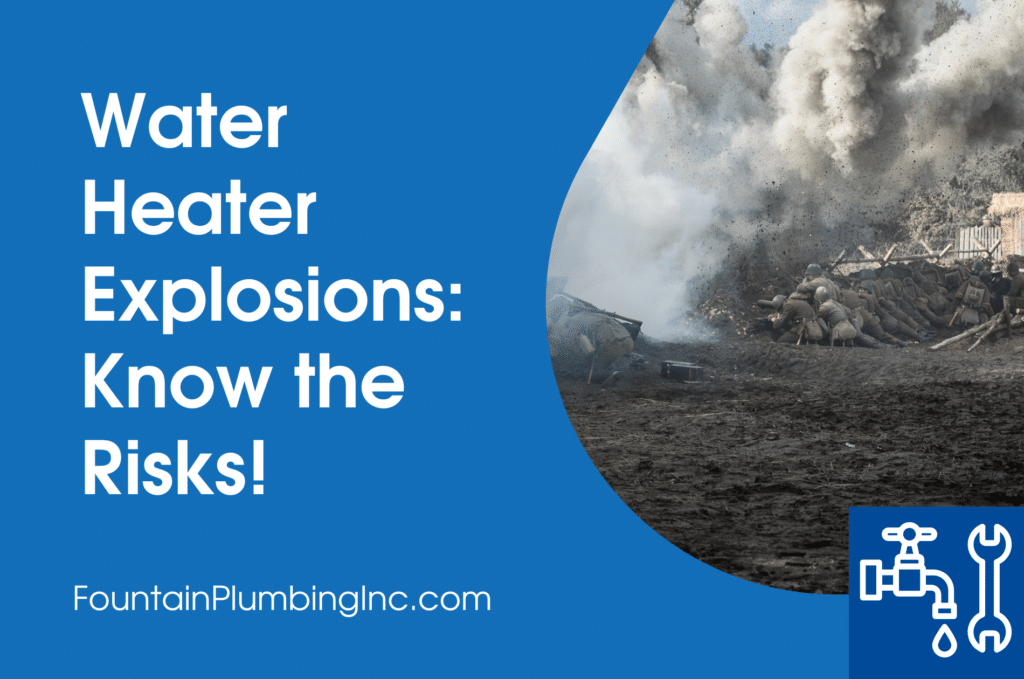While it may sound like something out of a horror movie, the truth is that yes, a water heater can explode. And if it happens to you, the damage can be catastrophic.
Though rare, water heater explosions can cause property damage, personal injuries, and even death. It’s a serious matter; if you suspect your water heater is damaged or faulty, call a professional plumber immediately to have it looked at.
But can they be prevented? Let’s take a look into how a water heater can explode.
Can a Hot Water Heater Explode?
Fortunately, water heater explosions are not a common event. It takes several things to go wrong inside your water heater to cause your water heater to explode.
Mythbusters even did a whole segment on water heater explosions. They ramped up the pressure inside the tank well above what it was rated for, and when it exploded, the debris hung for several seconds in the air.
Perhaps more alarming, the shock stickers they placed nearby — placed to determine the shockwaves created by an explosion — rated the blast as “lethal.”
If you’re interested in watching the whole thing, you can see the clip from the Mythbusters water heater episode here.
One thing to keep in mind though, was that in that episode, the Mythbusters team removed several of the safety devices on the water heater. Water heater companies install these items specifically so that they don’t explode, so as mentioned before, several things have to fail before you have a full explosion.
How does a hot water heater work?
It’s important to have a basic understanding of how your water heater works. Familiarize yourself with some of the parts that make your water heater work.
- Your water heater has a Pressure Release Valve. This may also be called a Temperature and Pressure Release Valve, or T&P Valve for short. This valve keeps your water heater from turning into a bomb. When the pressure in your water heater gets to a certain level, the T&P valve releases the pressure. It lets the pressure flow out into the drip tube into the drip pan.
- There’s a pipe or a tube – called a drip tube – that releases water out into the bottom of the water heater, out of the heater.
- At the bottom of the water heater, near your feet, you may see the drip pan. This is where excess water may be released and held.
Water Heater Explosion Warning Signs
As mentioned above, it’s important to have a very basic understanding of how your water heater works. Periodically, you should check your water heater for signs that it might not be working properly. Here are some basic steps to take to make sure your water heater isn’t building up the potential to explode:
- Your Water Heater Smells Like Rotten Eggs. The smell of rotten eggs is an indication that there’s a gas leak somewhere. Get it fixed as soon as possible, and keep all heat sources as far away from the water heater until it’s taken care of.
- You Hear Popping Sounds. Sediment buildup inside the water heater can create pressure differences, which creates a “popping” noise near your water heater. Even if it doesn’t explode, it’s still a sign that your water heater isn’t functioning properly and could fail.
- You Have Brown Water Coming From the Tap. Another sign of sediment buildup is brown water coming from your faucets. Alternatively, it could be a sign of rust buildup inside the storage tank. Both need to be handled.
- The T&P Valve is Leaking. The T&P valve is responsible for keeping the pressure inside the tank under control. If it’s leaking, that’s a sign that the water heater is about to fail.
The Average Life of a Water Heater
On average, water heaters only last from 8-10 years. That number can change though depending on the specific make and model of the water heater.
By contrast, a tankless water heater can last 15-20 years. They also usually require less maintenance and provide greater water efficiency.
To find out the expected life for your water heater, look for the “rating plate.” This tells you the serial number, model number, and manufacturer date.
However, a water heater could last longer than that. Tankless water heaters, for example, can last close to 15 or even 20 years.
How Often Should a Water Heater Be Replaced?
In addition to knowing how old your water heater is, it’s important to consider other signs that could signal that your water heater has the potential for an explosion.
While explosions are rare, water heaters do need to be maintained properly.
When you notice these small warning signs, that are telling you something could be wrong. If not handled properly, these small problems could turn into a larger problem.
Some of these warning signs include:
- Water that gets too hot
- Water that doesn’t get hot enough
- Running out of hot water too quickly
- Water that is a strange color
- Water pressure that seems too weak
- Temperature of the water changes often – sometimes it’s warm, sometimes it’s cold – it isn’t consistent
Any of these signs are telling you that your water heater isn’t doing its job. Whether your water heater is gas, electric, or solar, it should provide you with water that is an appropriate temperature. Your water heater should also be energy efficient.
You Can Prevent a Water Heater Explosion
It isn’t just a myth. Your water heater can explode. This can cause damage to your home and property.
When a water heater explosion occurs, it can flood your property. Water heater explosions can be catastrophic. They can destroy property and even cause death. These injuries are preventable, as water heater malfunctions are preventable.
If you’re not sure if your water heater needs to be replaced, call Fountain Plumbing today to ask about scheduling an inspection.

